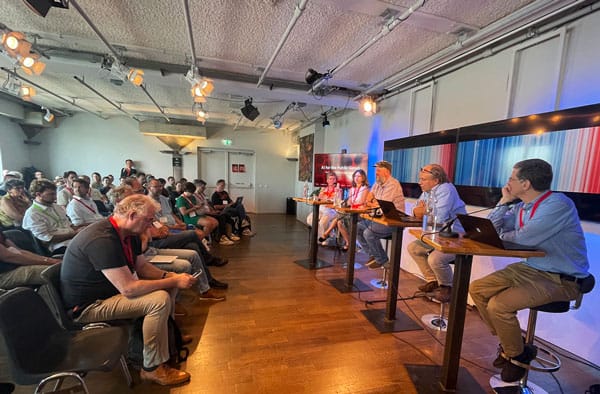Forget the dystopias and sci-fi. At this panel, the message was clear: AI, when done right, can serve people, not just profits.
“AI is applied statistics on steroids… with a serious marketing spin,” quipped Caroline de Cock, setting the tone for a no-nonsense, myth-busting panel on how AI can serve sustainability, culture, and society. She urged the audience to ditch the Silicon Valley glitz and look at AI like the Dutch polder model: “No one really knows how it works, but the dykes hold, and our feet stay dry.”
🔍 What Happens When Archives Meet Algorithms?
Jeff Ubois from the Internet Archive Europe Board delivered a wake-up call: the previously overlooked corners of digital preservation are now prime real estate for AI training.
“Archives have become relevant, not so much to humans, but to AI.”
He warned about the erasure of inconvenient data—climate, health, economic—being flushed down “Orwell’s memory hole,” while stressing the need for broad access to high-quality information to train AI in the public interest.
“Do you want your doctor’s AI trained on all human medical knowledge, or just what’s fully licensed and easy to access?”
🏗️ Build Public, Not Just Private AI
Ben Cerveny from the Foundation for Public Code flipped the narrative from tech disruption to tech integration. In his words:
“People invent things and call them technology. If they work, they become infrastructure.”
Ben’s vision? A future where cities, libraries, and schools have their own public models: transparent, accountable, and locally tuned.
“A public model should be a public asset—with governance, values, and sustainable funding baked in.”

🌍 The Global Majority Needs a Seat at the Table
Dr. Lucie Chateau from Utrecht University’s Inclusive AI Lab stressed the importance of looking beyond Western AI narratives.
“90% of young people live in the Global South. They’re not just data points. They’re creators.”
She introduced groundbreaking work in building regional language models and ethnographic research showing how AI is being joyfully and creatively adopted across India and Africa.
🌱 Climate GPT: AI vs. Our Biggest Crisis
Then came Daniel Erasmus, who cut through AI hysteria with a clear call to arms:
“The peril isn’t AI. It’s climate change.”
He showcased ClimateGPT, a lightweight, renewable-powered model trained to help tackle climate adaptation and resilience. It’s already being used for everything from judging sustainability awards to helping map the impact of extreme weather in real-time.
“We don’t need smarter things. We need better decisions.”
💡 Takeaways
- Archives matter not just for memory, but for justice and data equity.
- Europe must build public AI infrastructure, not just regulate private ones.
- Inclusion means participation: AI from and for the Global South is essential.
- Climate tech can’t wait, and smaller, focused models are more sustainable and actionable.
- System prompts = ethics by design: who should decide what your AI thinks?
As one audience member asked, could we one day replace politicians with AI trained on party manifestos?
“No,” came the quick answer. “But we can use AI to make better, more informed decisions.”
That’s the future this panel believes in: grounded, democratic, and just smart enough.
Check out the full recording of the panel here: https://conference.publicspaces.net/session/ai-for-the-public-good
The photo’s of the conference are online now on https://publicspaces.net/2025/06/25/fotos-van-de-publicspaces-conferentie-2025-shaping-our-digital-future/



